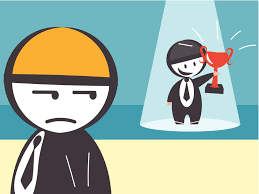 Envy is one of those feelings seen by some as a “negative feeling,” like anger or sadness. The Bible includes envy or coveting among the Ten Commandments of things not to do, in obeyance to God.
Envy is one of those feelings seen by some as a “negative feeling,” like anger or sadness. The Bible includes envy or coveting among the Ten Commandments of things not to do, in obeyance to God.
As a therapist, however, I do not subscribe to the idea of positive/good or negative/bad feelings. Feelings simply are. They are part of the human experience, the range of emotions we experience in life. Envy is no different. It is human to wish we had the advantages, accomplishments or relationships that another or others may have. For example, trustworthy friends, children, good health, a high-paying job, a slimmer body or a partner. We feel envious. When a woman with no children has a miscarriage she is likely to find it hard, soon after, to see women pushing a newborn or toddler in a stroller, harder still a friend with a child. She is envious, wishes she too had a child, and the pain of her recent loss is exacerbated by being around a friend and her child. She may want to limit time around them until it isn’t so painful. If she and her friend are close and confide in each other, she may be able to share her feelings and need to limit their contact for a period of time. A true friend will understand. S/he/they may inquire if there might be any contact or action that the friend would find supportive, and if not, accept the friend’s need as part of their friendship.
It is possible to feel both envy and happy for someone we have a mutually caring relationship with who gets something we desire, say an article published, a Ted-X talk or a better job. We may be able to acknowledge it with them and have it absorbed. We may be able to laugh about it. We may hear from that person about a time or times s/he/they may have envied us. There is no venom, and that is what makes it possible. I am blessed to have a dear friendship with this capacity.
There’s another practice I’ve found helpful when I’m envious of someone in regard to a particular attribute or gain they have. I remind myself that I don’t get to extract a particular thing(s) from that person’s life, that it comes as a package of the person’s entire life. Often, it’s clear to me that trading the entirety of my life with that of another is not desirable to me and the air in envy deflates.
Where things can get funky is when resentment, anger, worthlessness and devaluation get triggered with the envy. The latter is reflected in the phrase, “You think you’re better than me,” or another common one in our community, “She thinks she’s all that.” It is hard to be happy for someone when their gain has triggered a sense of worthlessness and devaluation in us, one that for marginalized populations has been planted and well-nurtured. Sadness, anger, even rage can rush in. But rather than judge such feelings as “bad,” I suggest we accept them when they arise, and hold ourselves compassionately with them, that we have this pain. This is part of what I understand as self-love.
It is also important that we reflect on them, rather than let anger rip. Has the source of our envy devalued us or treated us like we are worthless? If so, is the devaluation persistent or a rare mistake that has been/or can be repaired? If it’s been persistent, we can ask ourselves what has allowed us to be in such a relationship and if we want to continue. Does some part of us feel we don’t deserve better or is afraid of better? Are we constrained financially to stay? It is also important to consider whether we are projecting a sense of devaluation on the other, an expectation of such, rather than it being a reality. Sometimes people are thinking and acting like they are better than another, and sometimes, we are seeing them that way or expecting them to be that way because of other experiences we’ve had. Sometimes, both can be true.
In other words, we can allow our sadness or anger to help us look inward to explore what is going on and what our options are for dealing with these feelings.
If upon reflecting we see that the person we’re envying has not treated us badly, then other questions can arise. Does s/he/they deserve our anger or resentment? Who or what has nurtured a sense of devaluation and worthlessness in us? It could be family member(s), teacher(s), other so-called friends or the many tentacles of racism, sexism, classism, heterosexism infused in our systems of thought, language, imagery, behavior and institutional practices. Anger, rage, and grief are all appropriate feelings for such practices, as well as how devaluation lives in us. So often, those closest to us become the target for this anger or rage, beyond what they are accountable for. This exacerbates the pain in our communities of friendship, family, and neighborhood. Anger does indeed need to be expressed, but how it is done is critical. Though we may be vulnerable to blasting another in the throes of our rage-pain, it has its limits as a general and singular response.
If we have trusted friends who are not the source of our envy and resentment, and who will not judge our feelings or fan the flames for us to take rash action, it can be helpful to share our feelings with them, both the anger and the hurt. They can help validate our reaction, raise questions and brainstorm possible actions to take, and when.
Envy combined with anger/rage is high octane fuel.
That is why it is valuable to hold them compassionately, learn from them, and use them thoughtfully. The mission we put them to matters. I for one believe in dedicating the rage to actions of healing and social justice.

Thank you, thandiwe, for offering your insights on envy. Not only are you not sanctioning or pathologizing it, you’re encouraging us to look at it with curiosity and compassion. I especially appreciate how you explore feelings of envy in the context of oppression and devaluation. “Envy combined with anger/rage is high octane fuel” indeed, and channeling them toward actions of healing and justice ideally should be something we all aspire to.
Hi Julia,
I like your choice of “aspire to” because indeed we cannot expect to achieve it in every moment or episode. But without an aspiration, there is no focus for practicing, honing our ability to arrive there more often. Thank you.